Until 1999, no one knew about the Indian M. Night Shyamalan, but his triumphant film The Sixth Sense elevated the aspiring director to Hollywood’s Olympus. In 2004, Shyamalan brought us a dark, dramatic, fall-colored The Village.
I accidentally came across this film—I saw a still from it with Adrien Brody. And I was interested in how it happened that Brody starred in such a seemingly simple story. But I was utterly captivated when I pressed play – this film is like a poem! You can admire each frame for a long time, and many dialogues can be parsed into quotes. And after watching, there is something to think about!
I also really wanted to unravel what the point of The Village movie was. And today, I want to share my thoughts with you.
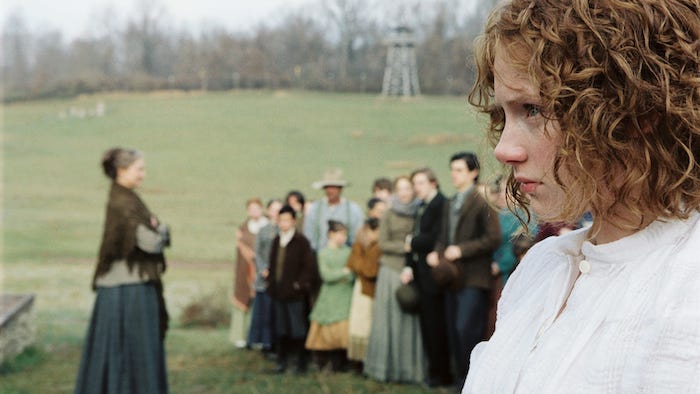
Summary.
The Village tells the story of a small community in Pennsylvania during the 1800s, where residents sought refuge from the temptations of urban life. It delves into the pact they formed with the menacing beings dwelling in the nearby woods and the journey of a visually impaired girl who braved the forests to procure medicine for her beloved.
Everyone in the Village has a role, and everyone obeys the laws of morality and ethics, which have become the basis of public life. The elders run the Village and make all the big decisions that impact everyone’s lives in the community. Somewhere beyond the forest are cities where another life is in full swing, but no one dares to enter the forest because this is foreign territory. Death awaits everyone who leaves the Village.
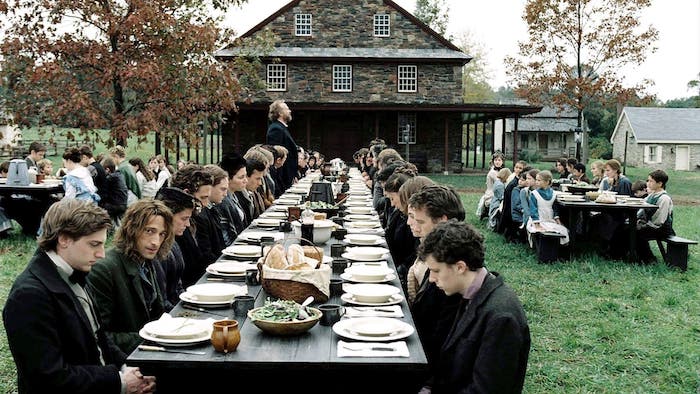
The Village cast is excellent!
Bryce Dallas Howard plays the main role, and this is her debut and the start of a successful career. Of course, only some people can remember the actress by her name. Still, she would later appear, for example, in “Spider-Man 3: Enemy in Reflection”, “Terminator: May the Savior Come,” and “Jurassic World.”
Shyamalan really saw the potential in the actress. She was able to show on the screen a blind girl who is strong in spirit and not afraid to sacrifice herself.
Joaquin Phoenix has a less bright role, but he plays it so coolly that he shows us on the screen a very laconic but wise, kind, strong, and sympathetic young man. Now and then, he comes out with some insightful quotes, so it’s a good idea to stop the movie and note them.
But Adrien Brody (The Pianist 2002) played his role best. He plays the role of a weak-minded fool who, due to the child’s level of psychological development, does stupid things and even hurts people. Personally, I respect the actor. He played his role flawlessly; you really believe him.
Sigourney Weaver and Jesse Eisenberg also appeared here.
Another advantage of the film is its soundtrack. The Village’s only Oscar nomination was for Best Score. Although the film didn’t win, the soundtrack here is perfect. Music creates a special atmosphere of mystery, sadness, and melancholy. When combined with the gloomy tones of the autumn forest thicket, music creates a special attitude toward the story, the characters, and the ideas the director wants to convey.
Visuals are an equally important component of the film. There are no action scenes, fight scenes, relatively few horror scenes, or CGI. But they are unnecessary since all efforts are invested in the most beautiful autumn forests, old houses, and unique costumes.
If you haven’t watched this film yet, please do so before reading my review. There will be spoilers ahead.
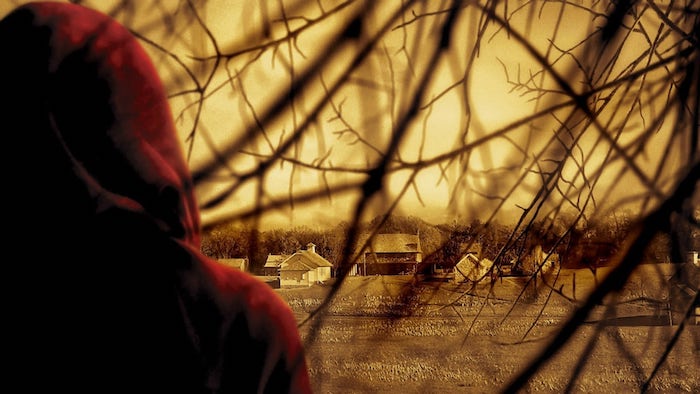
The Village 2004 is the right recipe for goosebumps.
It would seem that The Village is an ordinary story with the standard attributes of a mystical film.
But from the first minutes of the picture, the viewer is overwhelmed by the grief-filled scene of a child’s funeral. And you involuntarily understand that it is unnecessary to see a terrible monster or a humanoid alien to squeeze into a chair. Simply witnessing human misfortune is enough.
In my opinion, Shyamalan created a kind of “autobiography of humanity” in a simplified version. Fear and love are faithful companions in each of our lives. In The Village, these feelings had to collide in an unimaginable battle, the site of which was the heart of a young blind girl.
Toward the film’s end, the director reveals all human weaknesses—from uncontrollable fear to all-consuming jealousy. Everyone is familiar with these vices, but not everyone can cope with them. Finally, the secret of the Village, which is revealed towards the end of the picture, is striking in its genius—what are we willing to do for a quiet life, and what pushes people to become hermits?
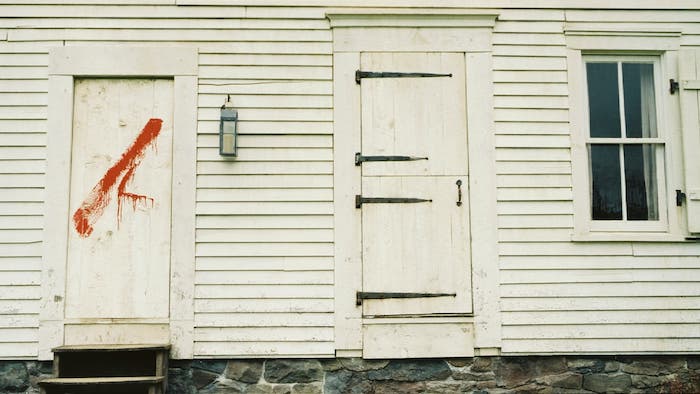
What was the point of The Village movie?
One of the elders who owned the Walker Reserve was a professor who taught US history at the university. To maintain stability in a small society and isolate it from the outside world, he created an atmosphere of isolation for the first European settlers in America with a system of direct democracy. These people constantly struggle with an aggressive external environment for their existence, which should unite them and exclude any aggression toward each other.
Initially, the group that settled in the Village was united by the pain of the brutal murders of their loved ones and the inability to withstand the pain and grieve. They found their way together to find a community close to the rest and break with the past. But in every house, there remains a black box where newspaper clippings about these murders are locked. The boxes symbolize this unbearable and unprocessed pain and are a permanent memory.
There is also fear, which also turned out to be impossible to cope with, so strong that they decided to pass it on to new generations in stories about terrible monsters living in the surrounding forest. And to confirm, the adults took turns dressing up in the costume of such a monster and scaring the rest of the residents. And even for those who knew the truth, the fear of the monster was real because it was a symbol of real human monsters killing their loved ones. Thus, a collective psychosis arose in this group, covered by external calm, care and attention.
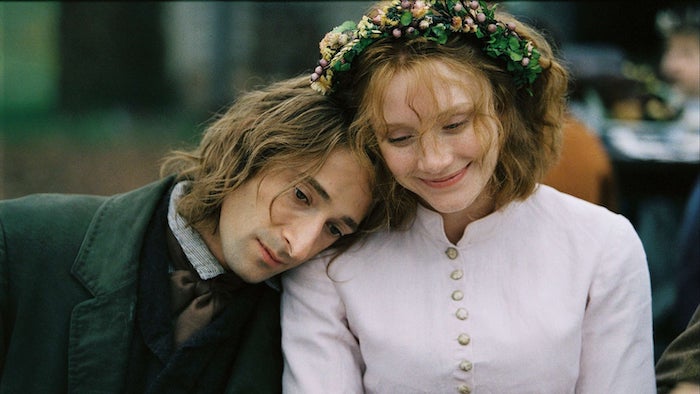
Over time, the older generation, unable to cope with internal experiences, projects their condition onto their children. And the children become special. The boy Noah has lost his mind to endure this gigantic deception set by the community and family. Ive is blind but sees the “shine”; blindness helps better to understand the reasons for the actions of others and draw their conclusions. Their friendship is easy and possible. But Noah, along with his sanity, loses the opportunity for a closer relationship with a girl, so when she falls in love with another, she experiences mortal horror at the loss and tries to kill her rival, thereby expressing her feelings.
The villagers are facing an attack on their borders while dealing with a terrifying situation they try to keep hidden. They must decide whether to let the young man die or break their oath and seek help from outsiders.
Cruel things play out in the lives of young people, overwhelmed by vivid feelings—the girl could have died on the road, and the young man would have died without medicine. So that Ivy is not afraid, her father tells her the history of the settlement and shows her the monster costume. It gives her the strength to cope with her fear and go.
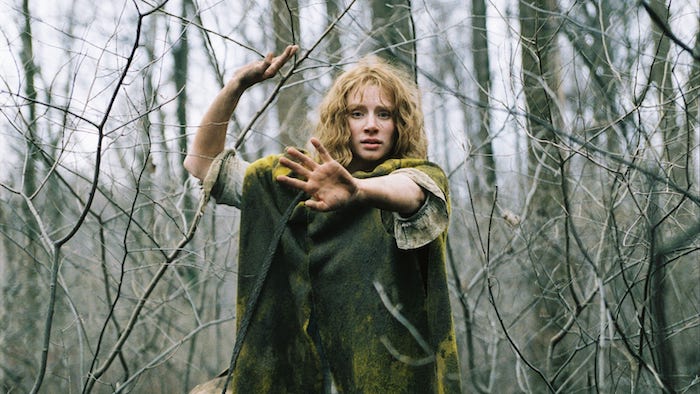
At this time, Noah somehow senses what is happening and runs after her in a scary suit. In the forest, Ive meets a real, ill-conceived monster who is in psychosis, experiencing horror from loss, rage, and the desire to destroy the object that causes this rage. Blind Ivy, running away, intuitively acts so that Noah falls on a snag and dies, but she does not see what is happening. She stays strong and brings medicine.
What’s going on with the group? They mourn Noah and understand what happened to him. But they turn this story into confirmation of their legend—about the existence of monsters and that only people with pure thoughts can pass through their forest. The villagers could not cope with their fears and were ready to continue in a state of psychosis, imposing it on subsequent generations and leading to tragedies.
At the same time, the blind Aive and the cured Lucius as a couple symbolize the hope that has arisen in the group – for the restoration of trust in the world and for the possibility of new close relationships despite the pain experienced.
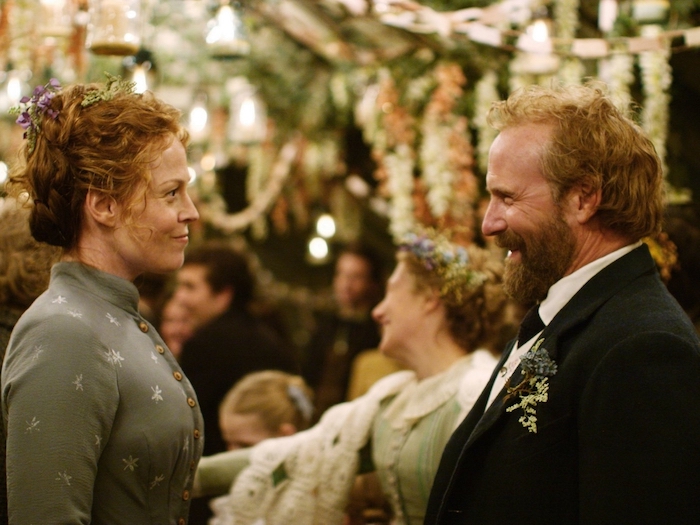
Ending.
So, the film ends with Ivy safely returning to the Village with medicine for her loved one. However, the entire community is preparing to extend the reclusive lifestyle. But I wouldn’t want you to remember this film with the ending on a sugary vanilla love note. Let’s remember a few details that make the film’s ending interesting.
For me, blind Ivy is our intuition, which also wanders in the dark in this world. By the way, a forest in psychology symbolizes the unconscious in which our repressed fears live.
In the film, the father tells Ivy that he heard this myth about monsters in the forest and decided to use it as a village legend. The blind girl goes into the forest, knowing that nothing threatens her. But Noah attacks her for real, and she does not understand how it happened. In this scene, you will see a wonderfully shown situation of how the fear of the new is born, and this situation can be transferred to our lives.
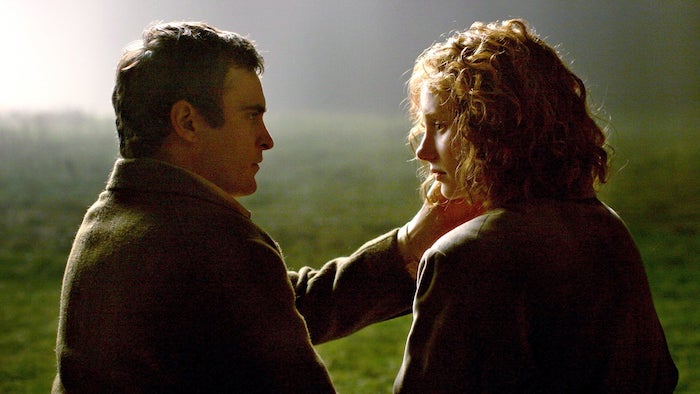
In my opinion, the heroes from the Village have several development paths after the finale, and each of them is very vital.
- They will continue to live in isolation until they degenerate.
- Among them, there will be daredevils and explorers who will not be able to live in the tiny world of the Village, and they will step into the forest.
- The villagers will go out into the city, but the new environment will shock them, and they will return to the Village for a new round of isolation.
- Or the contract for protecting the nature reserve will end, and biologists will find their cute Village.
This tape tells the story of a group of people, but each of us has Ivy, Lucius, and terrible monsters. Which future will you choose from the list above?
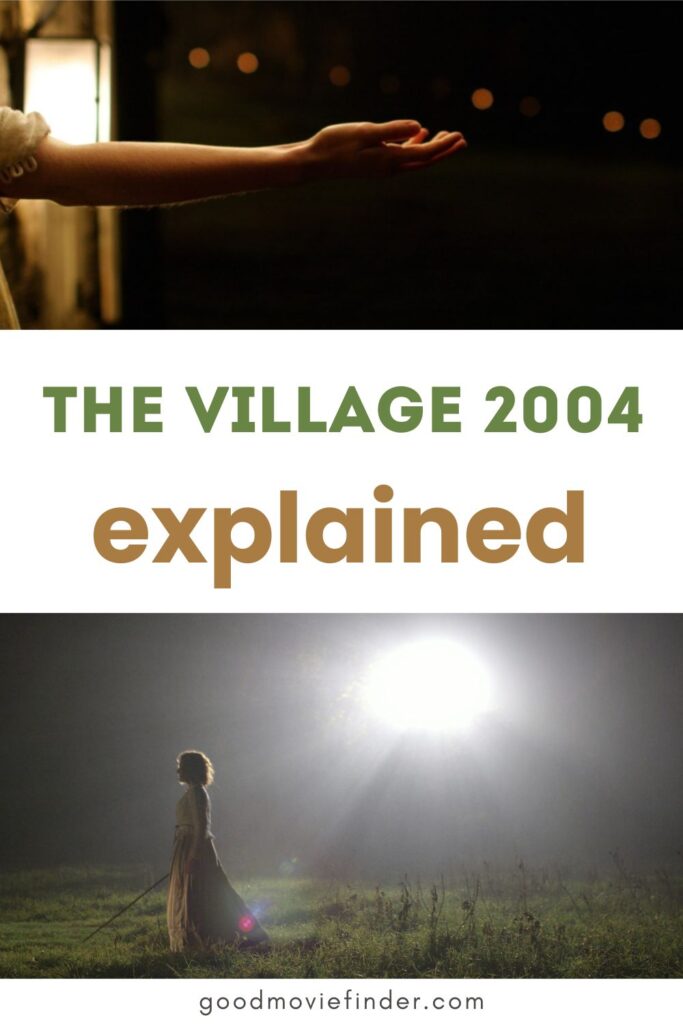
Final words.
The film The Village is about the inseparability of misfortune from human life, the original presence of evil in human nature, and love as the only weapon capable of defeating such evil.
Have you watched this movie? Let me know what you think about it. I think it’s a must-see, but I’m open to hearing different perspectives on Shyamalan’s movies.
If you found my blog post enjoyable, I’d appreciate it if you shared it. Thank you so much.
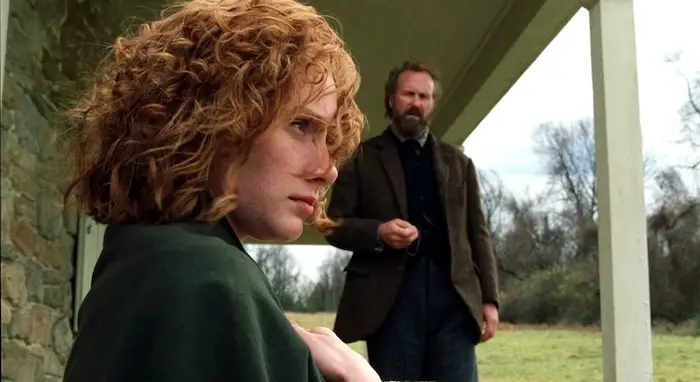
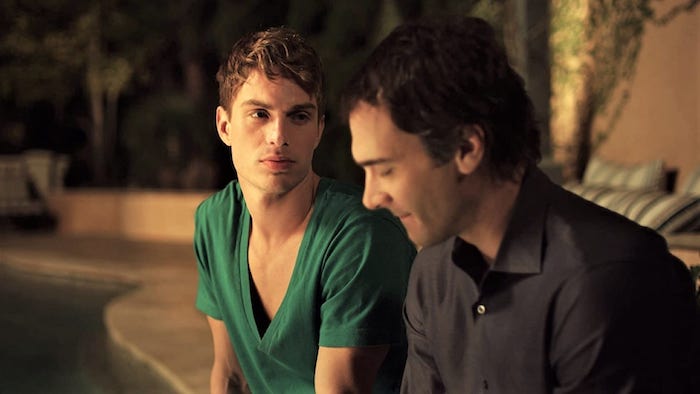
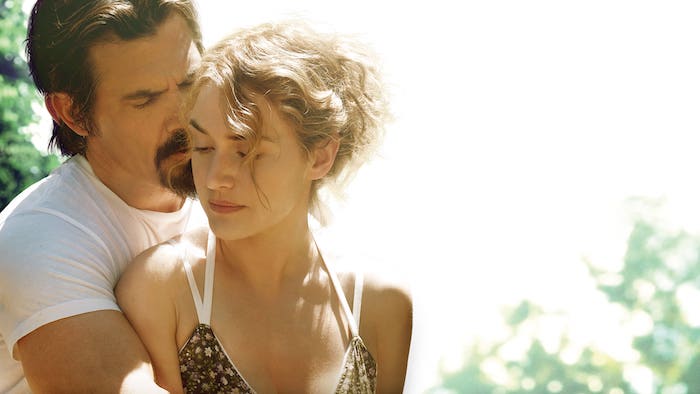
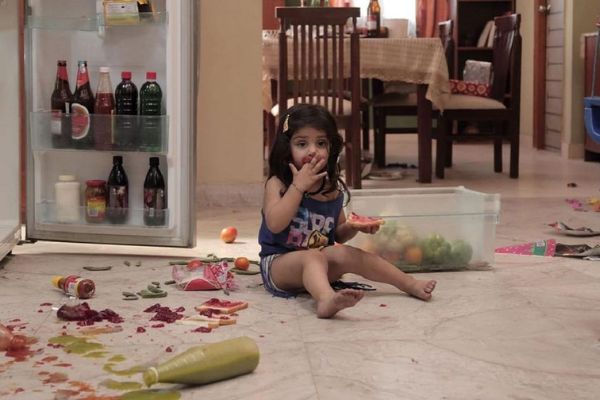
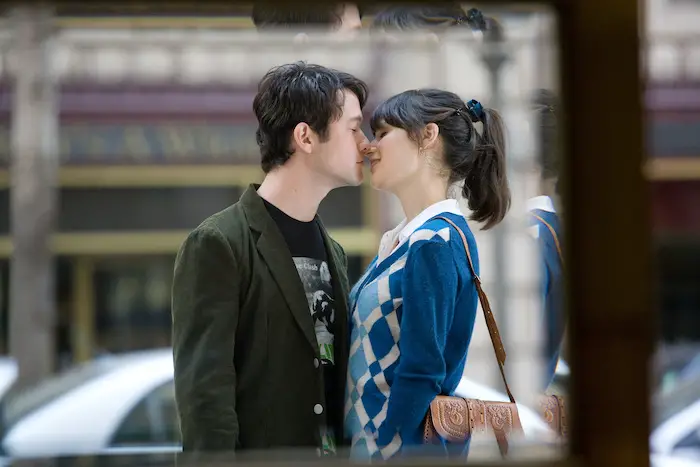
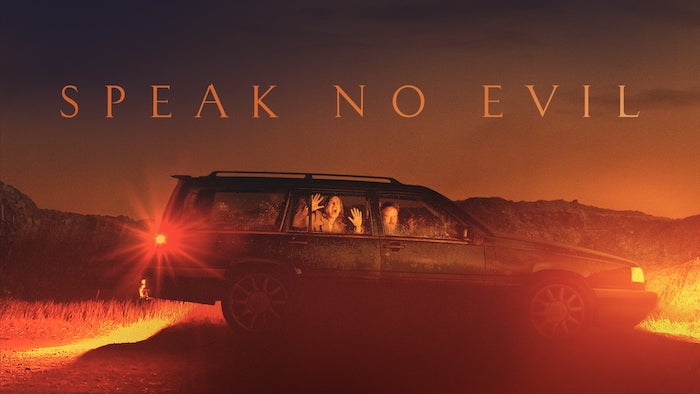
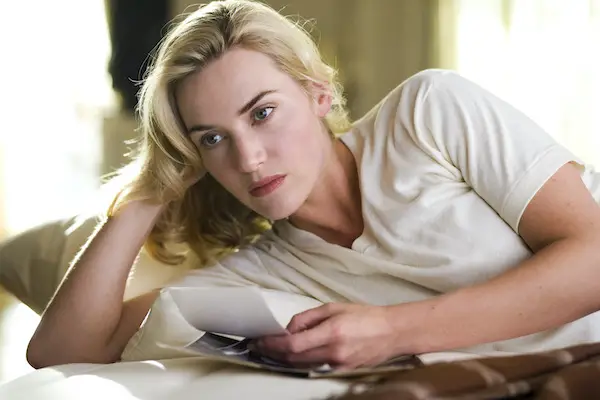
The Village has officially made it to my watch list!! Thanks for the review!!
I’ve heard great things about this film, but I’ve not had the chance to see it yet! I like a lot of Shyamalan’s other movies (they’re always so captivating and interesting), so this one has been on my list for a while.
I’m always interested in reading reviews for movies I have not heard of or seen yet. This review has me exited to check out the movie. I am a fan of Adrien Brody so this is a must see!
This is a fascinating explanation of The Village! The discussion on whether the end justifies the means in this film is thought-provoking and adds depth to the storyline. Thank you for shedding light on this!
It’s intriguing how Shyamalan uses isolation and tradition to amplify themes of deception and societal constructs. I definitely enjoy the movie and have watched it repeatedly.
I keep reading about this film and I have yet to see it. Great review, now I must make some time to watch it.
I’ve never seen this movie before, didn’t even know it existed. Now it’s on my watch list.
I haven’t seen this movie yet but it was interesting to know things from this explanation. I will try to watch the movie soon. Thanks for sharing.
I remember being weirded out by the ending of this film. I should watch it again! Thanks for the great review!
I haven’t seen this movie, but it sounds like an interesting watch. Great review!